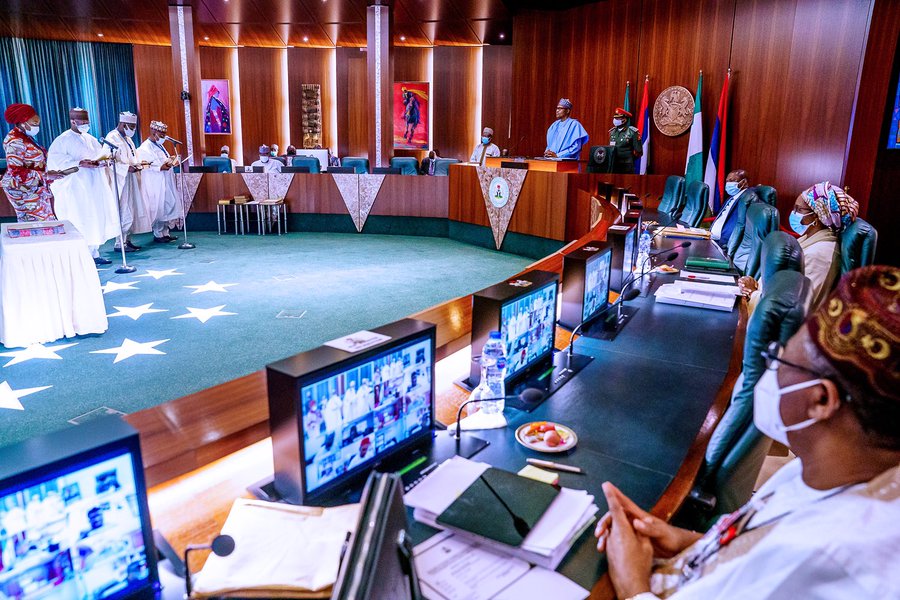– Lagos, Kano Roads Get N30.2bn
Nigeria will contribute $2million to the 2020 budget of the the West African Power Pool (WAPP).
Advertisement
The figure was approved on Wednesday by the Federal Executive Council in Abuja.
President Muhammadu Buhari presided over the 19th virtual session of the FEC at the State House.
WAPP serves 14 of the 15 member-states of the Economic Community of West African States (ECOWAS), namely Ghana, the Gambia, Benin, Côte d’Ivoire, Burkina Faso, Guinea, Guinea Bissau, Senegal, Sierra, Liberia, Mali, Niger and Nigeria.
The pool was established at the 22nd Summit of ECOWAS Authority of Heads of State and Government 21 years ago in 1999.
Advertisement
In 2006 at the 29th summit in Niamey, Niger Republic, its Articles of Agreement were adopted.
The aim is for the pool of energy generated to service the electricity needs of the member-states.
Speaking with State House Correspondents after the FEC meeting, the Minister of Power, Saleh Mamma, said Nigeria would gain in foreign exchange by participating in the regional market.
Saleh stated, “The pool is about having synergy within the West African region. The decision has been taken by ECOWAS, it’s for the generation of electricity of the region, so as to have more constant and steady power supply. It’s like the national grid in Nigeria, so we are going to have regional grid.
“It means in case there is a failure in one country, another can supplement. The $2 million is a contribution.”
Advertisement
The Minister of Information and Culture, Lai Mohammed, also spoke on the relevance of the pool.
He explained, “The West African power pool is made up of all west African countries because each member state contributes annually to the cost of power transmission across the pool. Because, the consequence is that if there is a problem in one country it could inadvertently affect the other country.
“This was created in 1999 by authorities of the West African Heads of State. It’s a common pool and every country has its own section and our contribution for this year is $2 million. It’s not as if we are giving $2 million to ECOWAS, we are simply paying our own contribution for the transmission from Nigeria to other wear African countries and viz-visa.”
Mohammed disclosed that the meeting approved over N30.2billion for roads in Kano and Lagos states.
One was the N22.2bn approved for the award of contract for the reconstruction of the Apapa-Oworonsoki-Ojota Phase Section II.
Another N8bn augmentation was approved for the award of contract for the dualisation of Kano-Maiduguri Road.
Advertisement
On his part, the Minister of Transportation, Rotimi Amaechi, told reporters that N1.2bn inclusive of 7.5 per cent tax, was approved for the supply, deployment, installation, testing and commissioning of security equipment for seven railway stations.
According to him, the stations are in Idu, Rigasa, Jere, Kubwa, Kaduna and Kano and have a completion period of 12 months.
Also speaking, the Director-General of the Bureau for Public Procurement (BPP), Mamman Ahmadu, said N1.6bn was approved for e-government procurement.
Ahmadu stated, “E-government procurement has the potential of improving procurement process, eliminate corruption and reduce the leak time in the procurement process itself. There have been a lot of complaints about the long time it takes to go through the due process. With the establishment of this, we will reduce that time.
“It also removes subjectivity from the process. There have been lots of complaints about subjectivity in the approval process, that will be dealt with squarely when it is eventually launched.
“E-government procurement is a global trend and from the research carried out by the World Bank, it had been established that countries that have taken off with e-government procurement have witnessed exponential economic growth and and they have stimulated ICT in those countries.
“It will reduce corruption to the barest minimum because it will reduce the human interface within the process.”
The Minister of Communications and Digital Economy, Isa Pantami, spoke on the approval for the national policy on virtual engagements in federal public institutions.
It is to be coordinated by his ministry and the Office of the Head of Civil Service of the Federation.
He gave details, “In January 2020 as we all know, the world had been taken by surprise with the emergence of COVID-19 in which the World Health Organisation declared it as a global health challenge. By 11th March 2020, WHO declared it as a pandemic and that COVID-19 has disrupted the world and the way we conduct our activities and now virtual engagements are becoming the new normal.
“It is because of this that we came up with a memo that will institutionalised virtual engagements in federal public institutions in order to make sure that even after COVID, virtual engagement is recognised by the Federal Government of Nigeria as a medium of communication. “



